#also I'm sorry it took so long
Text
1000 Books You May Have Actually Read
#Polls#Literature#Books#Lists#15000#I've read 106 books - it took me so long to pass the 100th mark ;____;#Also I realised I should have written 'More than 175' and not 'More than 176'#I messed up there I'm sorry ;____;
18K notes
·
View notes
Text
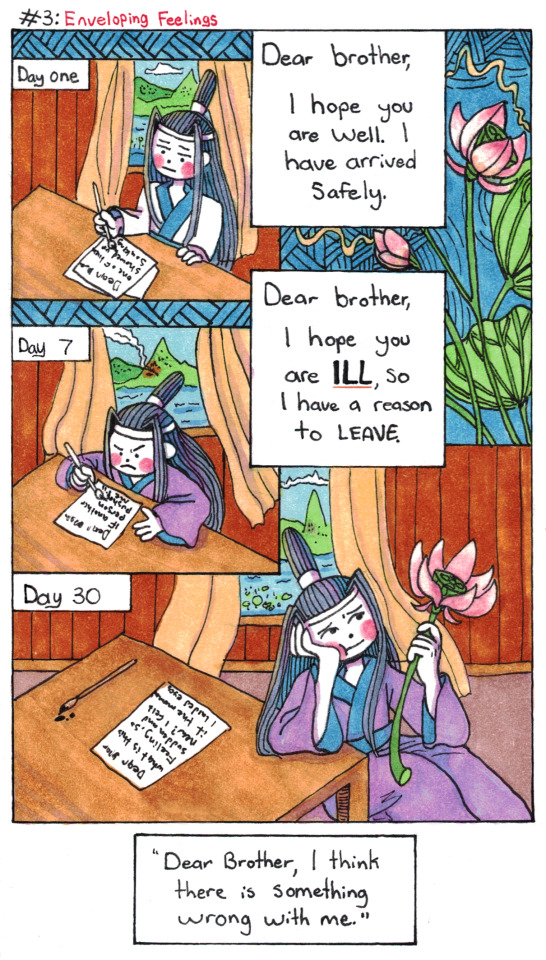
Lan Wangji Goes To Lotus Pier AU: Part 3: Enveloping Feelings.
(Part 1, Part 2, Part 4 (soon))
#poorly drawn mdzs#mdzs#lan wangji#Yungmeng Jiang training arc AU#I wanted to try out a different paneling style for this one - sorry I'm a day late! (there will still be a post tomorrow to keep on track)#The original 3 panel comic idea was fine but the point of this new schedule was to take time to push myself a bit more.#I was taking a look back through some comic artists I felt inspired by#and I really loved how Lynda Barry fills her gutters with patterns and doodles!#Obviously I'm not going as absolutely wild with it as she does but it was a great exercise!#I truly think the gutters are the most important and most overlooked part of any comic. There's lots going on in that space.#It's the same with timeskips. The implied movement between moments that we don't see changes depending on how wide that gap is#You're here for the funny tags so here's some that ties this time talk together:#I think LWJ was thinking about that second note from day 2 but it took him 7 days of hazing to commit it to paper.#I think he sends it a day later and immediately regrets it. Chasing down the messenger and everything.#You know if something actually happened to his brother he would never ever forgive himself for putting the bad vibes out there.#Third time skip was the hardest because there was so many possible flavours of jokes here. Day 8/9 was a personal favourite.#day 14 was also funny (week by week). I think the debate on 'how long does lwj take to catch feelings' is more or less:#'how long does it take for him to arrive at a particular stage of grief and yearning (and awareness of it all)#This is a symphony. There is an act by act structure. Every day he is fighting to keep his old sensibilities. He is losing so badly.#(I'll be returning to the main comic soon but there is more of this AU to come!)
2K notes
·
View notes
Text
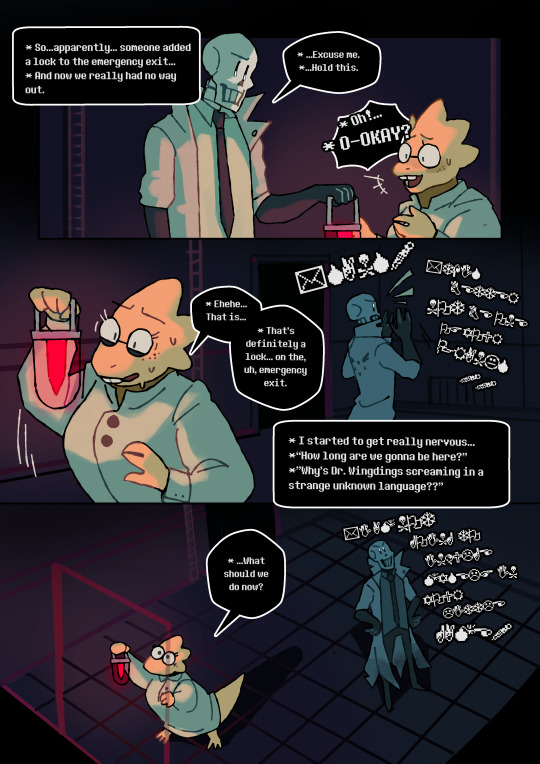
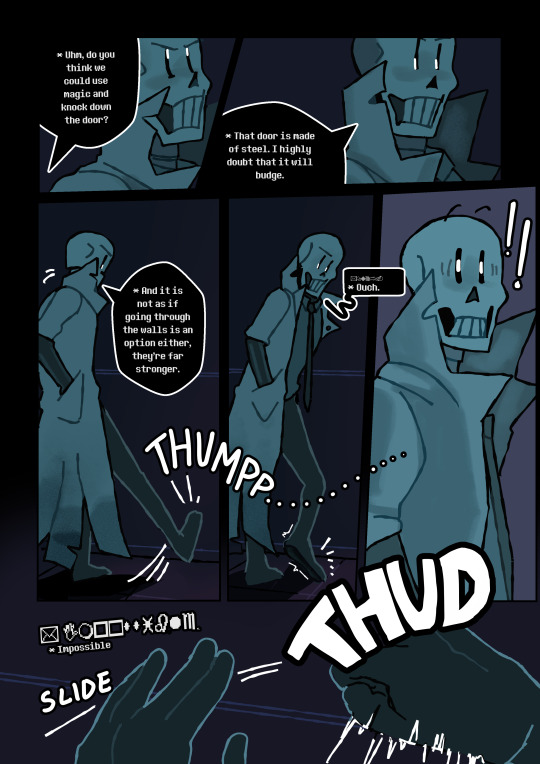

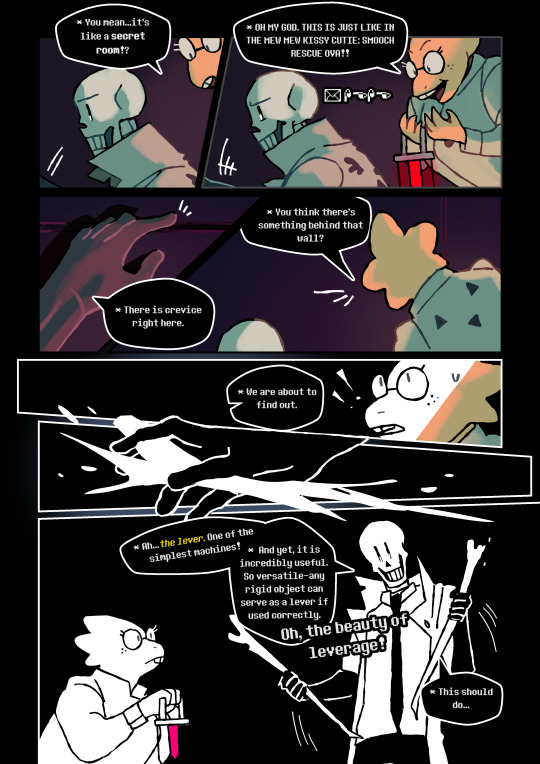

FORGETTABLE-AU (Page 48-52)
FOUND
[BEGINNING] [PREVIOUS] [CONTINUE]
#THESE TOOK SO MUCH LONGER THAN EXPECTED OH MYGOD#I DID SO MANY DIFFERENT THINGS HERE#AND ALSO LIKE#I HAD TO GET TO THAT FINAL POINT AND I JUST COULDN'T ON 4 PAGES#I didn't translate the wingdings in some parts cause I wanted you all to feel the way Alphys is feeling lol#I'm sure some curious person will translate it#UHM#Nothing much else to add#I really like the composition of some of these panels#aughh#THIS TOOK SO LONG#BUT YAY IT'S FINALLY HERE SO SORRY IT'S LATE#ACTUAL TAGS NOW#undertale#forgettable-au#undertale au#gaster#undertale comic#papyrus is gaster#papyrus!gaster#alphys
731 notes
·
View notes
Text

these are the silt verses, and I name our disciples thus
#the silt verses#sister carpenter#brother faulkner#paige duplass#james hayward#not 100% happy with this but I've been working on it for uhh two months and wanted to get it up before the next ep#cannot stress enough this isn't necessarily how i picture these characters but moreso what I can draw LOL#every time I try to conceptualize them it's like trying to look at someone without my glasses#in that i get vague forms etc but nothing concrete#it's weird bc it's like. the more i relisten the less concrete image i have of them /thinks#though I will say i will die on curly haired + freckles faulkner#and I usually picture carpenter with a simple wavy ponytail#also in terms of scars i like the idea of faulkner having a scar on his hand from the glass in the s2 finale#and hayward having a scar on his forehead from hembrey!#also i don't think hayward smokes but i liked how it looked when paired with paige and her alcohol!#also something something he might have tried once to blend in with the other police officers but never took to it#been wanting to draw something for silt verses for forever so!!#edit: added an alt id in the image description!#uploaded this last night and completely forgot to i'm sorry!#pls lmk if it's too long or not really a good description!
1K notes
·
View notes
Text

Espeon, Dusk Lycanroc, and Sylveon ko-fi doodle for Kaitlyn!
I'm accepting pokemon ko-fi doodle requests here! ✨
#artists on tumblr#pokemon#espeon#dusk lycanroc#sylveon#gotchibam arts#ko-fi doodle#thank you sm for the request!! <3#i'm sorry this took so long ;_;#been having an art block for the past week so I couldn't finish any doodle#I think i'm getting back to it now tho esp. since the weather here is cooler now#w/c helps a lot (the past days has been terribly hot so yeah)#anyways i'll get back to ppl's msgs soon!!#also need to update stuff for my kofi members >_<#i'm getting behind a lot of stuff but I hope u guys can be patient w/ me ;o;
2K notes
·
View notes
Note
I got a really tough question.
What’s your favorite Twst event of ALL TIME?
I like Harveston
this truly is the hardest question. :( but after much consideration, I think Endless Halloween Night wins out for me, because it's nonstop Characters Being Silly the whole way through. the whole thing is just lots of these little dorks having the most ridiculous interactions, which is always my favorite! and of course the big twist is SO delightfully stupid and doubles down SO hard that it becomes AMAZING and I 100% unironically adore it. AND it's Halloween! everyone is in their cute little costumes and having a spooky adventure! it's great!
however, I am ALSO a big fan of the Harveston event! how can I not be! everyone is wearing comfy winter outfits and getting along really weirdly well with Epel's grandma and he's getting a little worried about that! my terrible loud son sews a plush squirrel and then gives it a silly little nickname and refuses to leave it behind when it breaks! the ending shot with the sled! I LOVE IT.
obviously we need the best of both worlds now

#art#twisted wonderland#malleus in the background: RYUU } >:(#(this is an au where sebek wears his own halloween costume and isn't obsessively trying to match with malleus)#(unless malleus is also wearing a patchwork squirrel costume. hold on wait i should've drawn that instead)#my favorite is when people draw sebek's room and have risugurumi just hanging out on his desk or something#SHE GAVE HER LIFE FOR HIM#well she gave her leg or something anyway#it's been a while i forget#anyway endless halloween night also has my favorite cutscene#which is the five second long cutscene that is literally just floyd going OOH WHAT DOES THIS BUTTON DO and then a battle starts#thank you twst#i believe this is also when trey finds out that sebek's dad is a dentist and immediately makes it weird#while rook is just. dancing around and singing opera in the background.#'did...did he hit his head when we fell through the mirror?' 'no he's just like that'#i have to stop or i'm going to end up recounting the entire event#(sorry this took so long!) (i have been back in Deadline Hell)#(i didn't mean to actually answer this on halloween but it kind of worked out! HAPPY HALLOWEEEEEN)
2K notes
·
View notes
Text
Oumota comic, Part 2
Headcanon - Kaito has nicotine withdrawal during the events of Danganronpa V3 (among other things, what happens to him there). Just a cute little comic
Part 1: https://www.tumblr.com/breadmecoshy/736606178824650752/oumota-comic-part-1?source=share



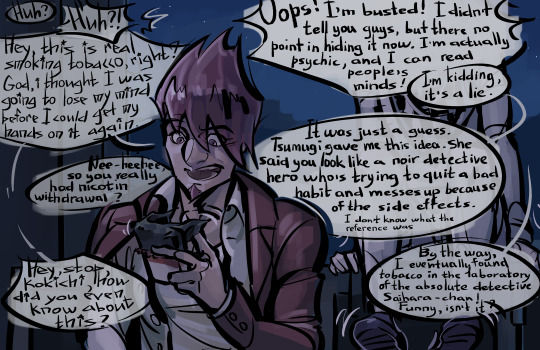

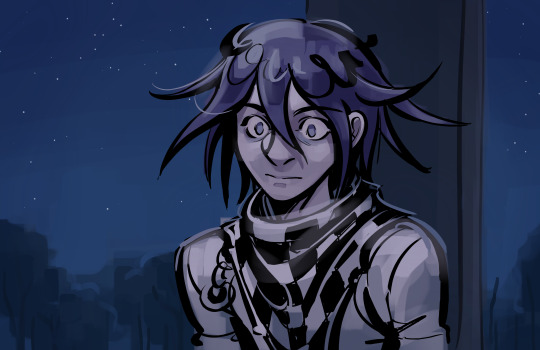
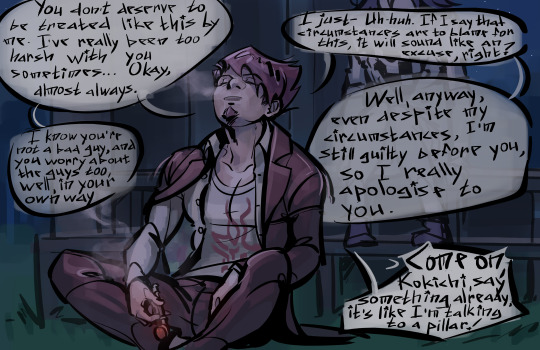

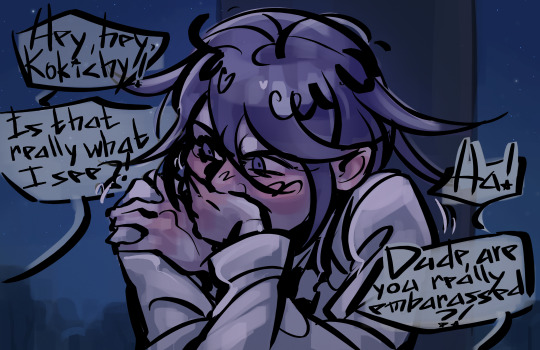

Plot Twist - After finishing the main game (which we all want to believe was a simulation), Tsumugi became so attached to the guys at V3 that she talked Danganronpa's company into launching a spin-off in romcom format in which she would try to bring together the couples most popular with viewers
joke (or maybe not)
#Kokichi deserves to be sincerely thanked for once#He was completely unprepared for this wasn't he#Kokichi's face finally got at least some colors of life#I'm just gonna ignore the fact that it took me so long to finish it#It's also probably a little disappointing considering how long you had to wait for such a simple denouement#I'm sorry if I've created inflated expectations haha#Anyway I'm glad I finished it I love this little piece#danganronpa#danganronpa v3#drv3#danganronpa kokichi#danganronpa kaito#drv3 kokichi#drv3 kaito#kokichi ouma#kokichi oma#kaito momota#oumota#danganronpa oumota
595 notes
·
View notes
Text
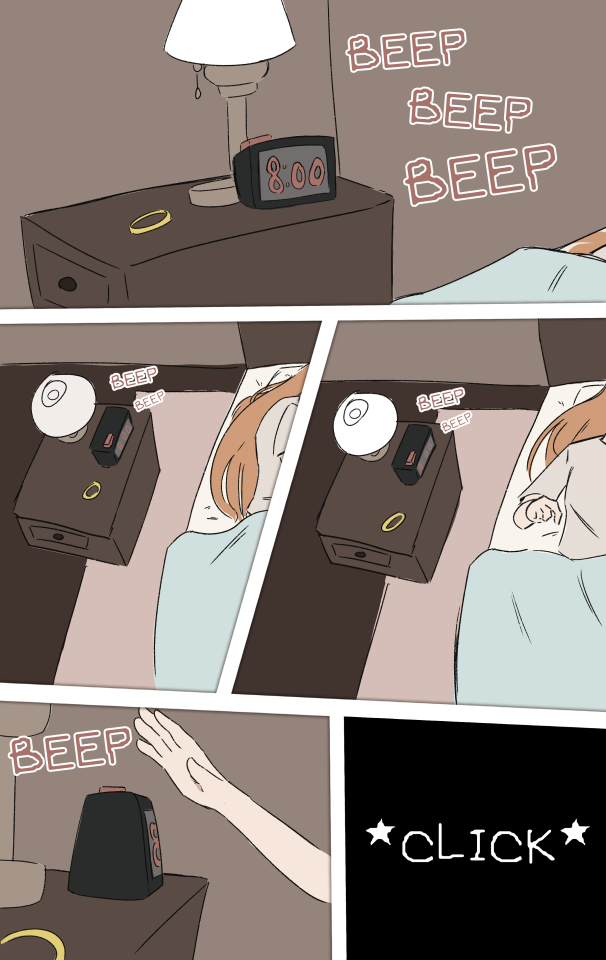
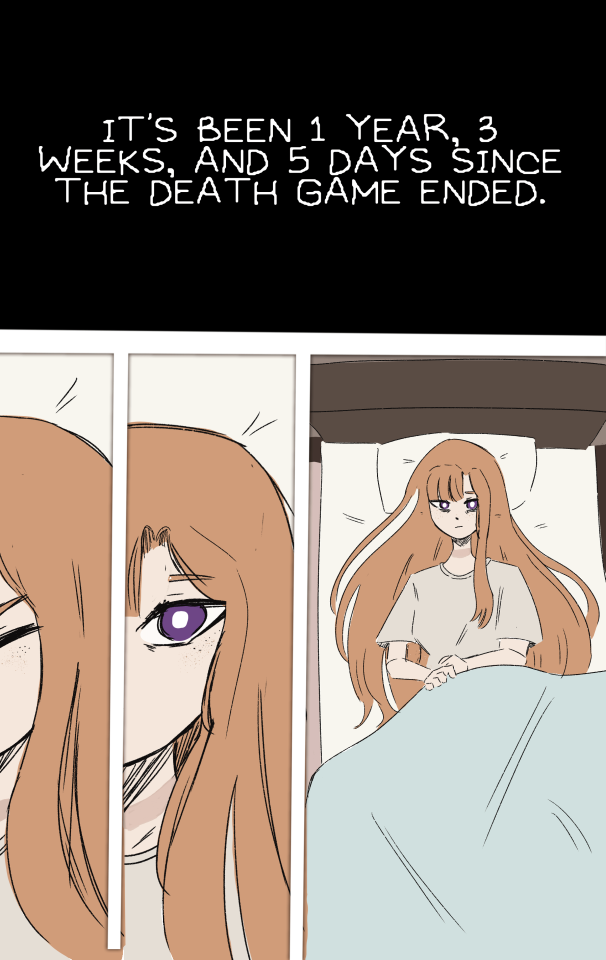
Moving Forward. (Spoilers for YTTD up through 3-1b)
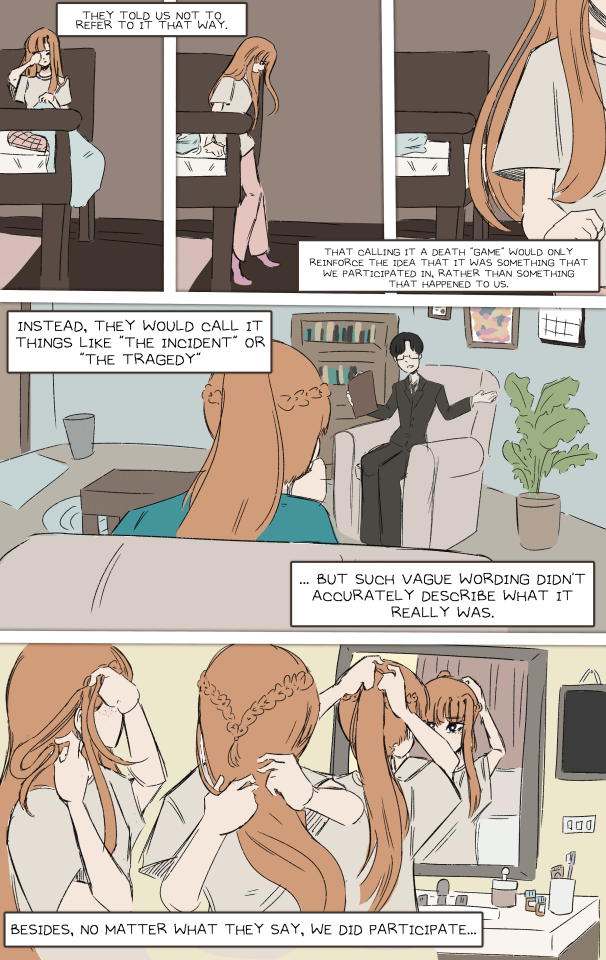
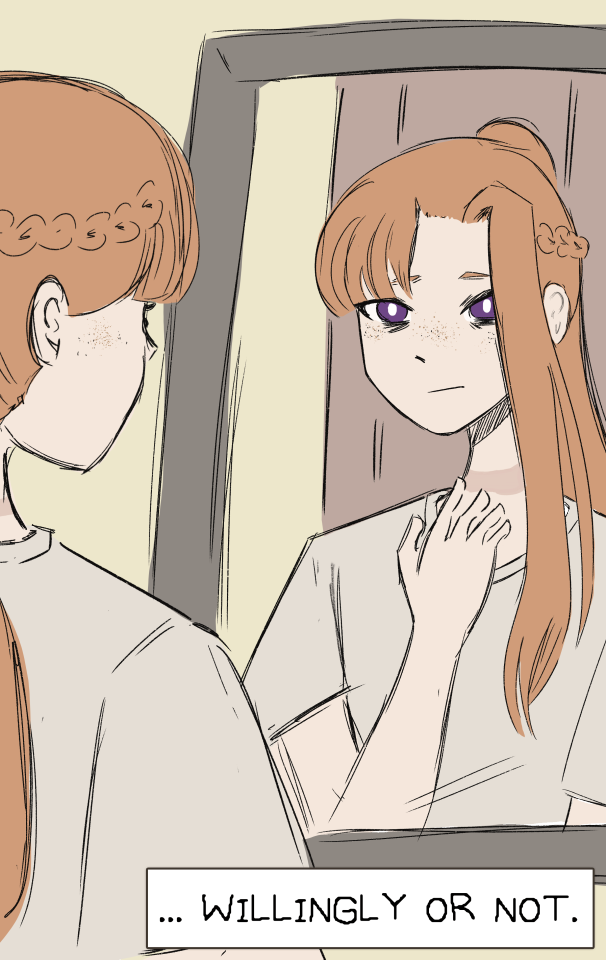
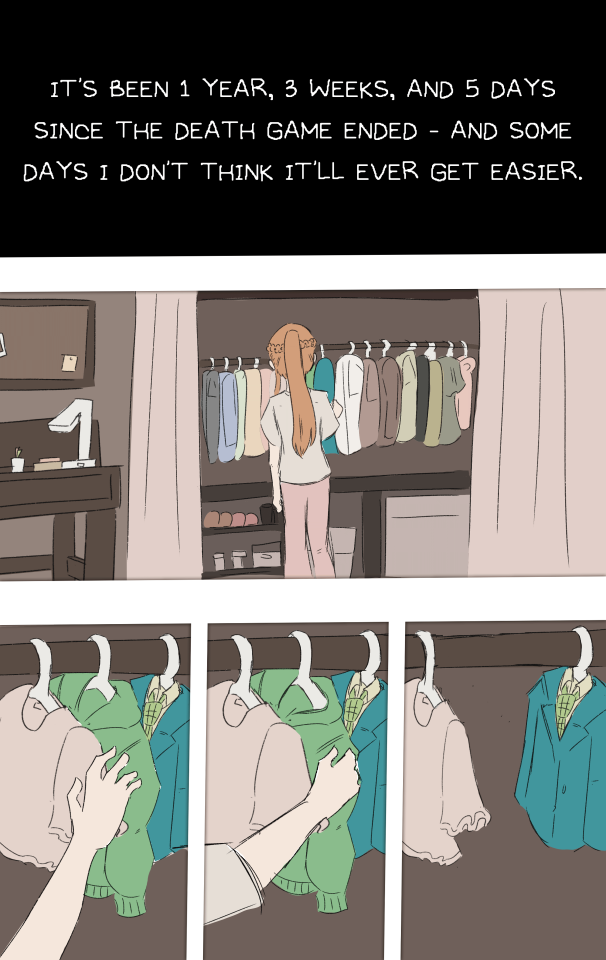
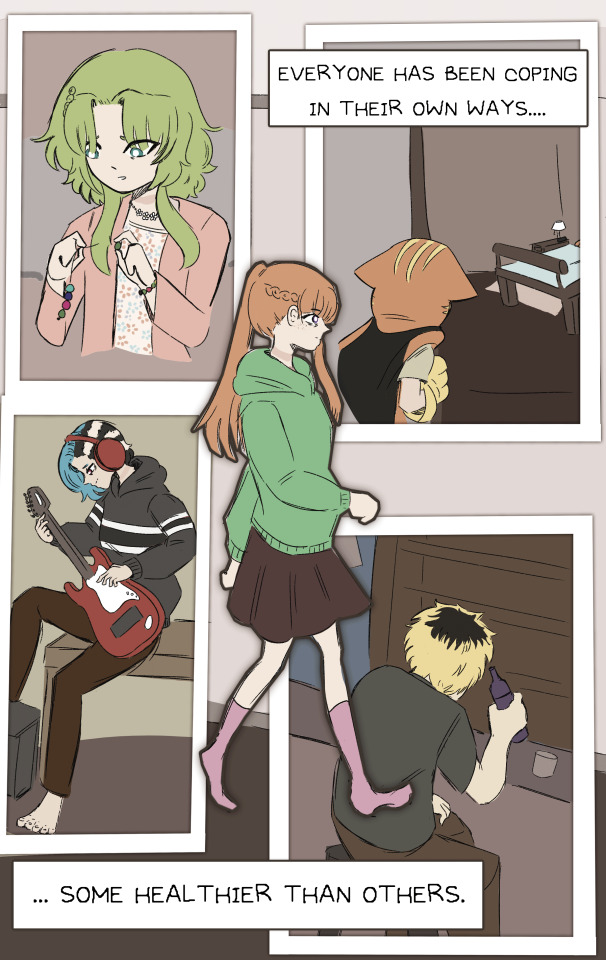
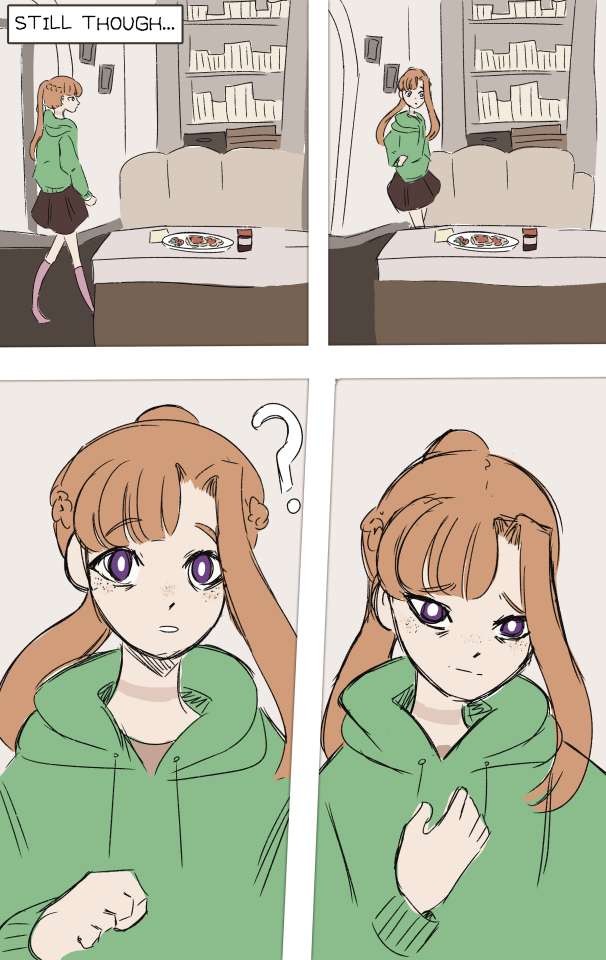
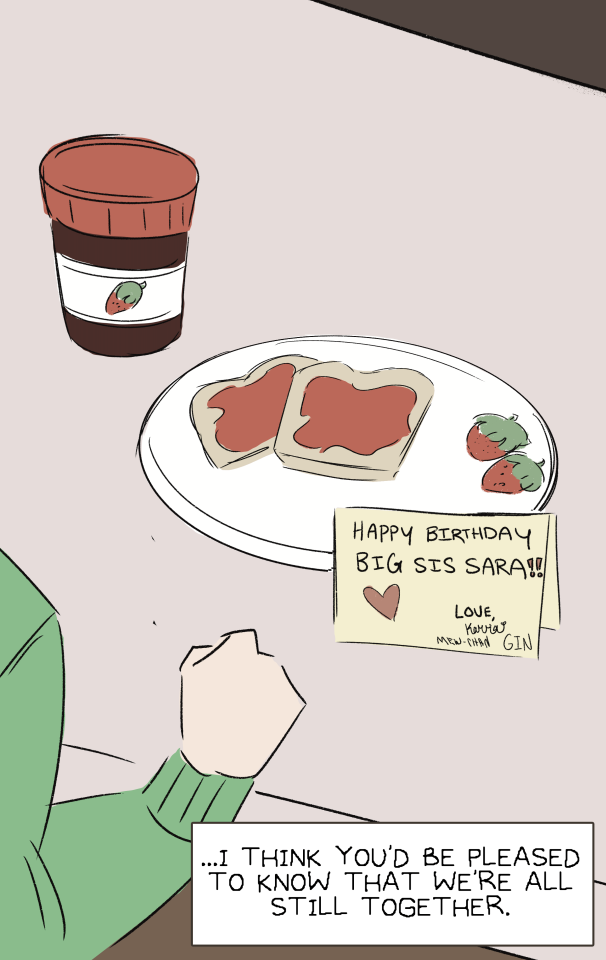
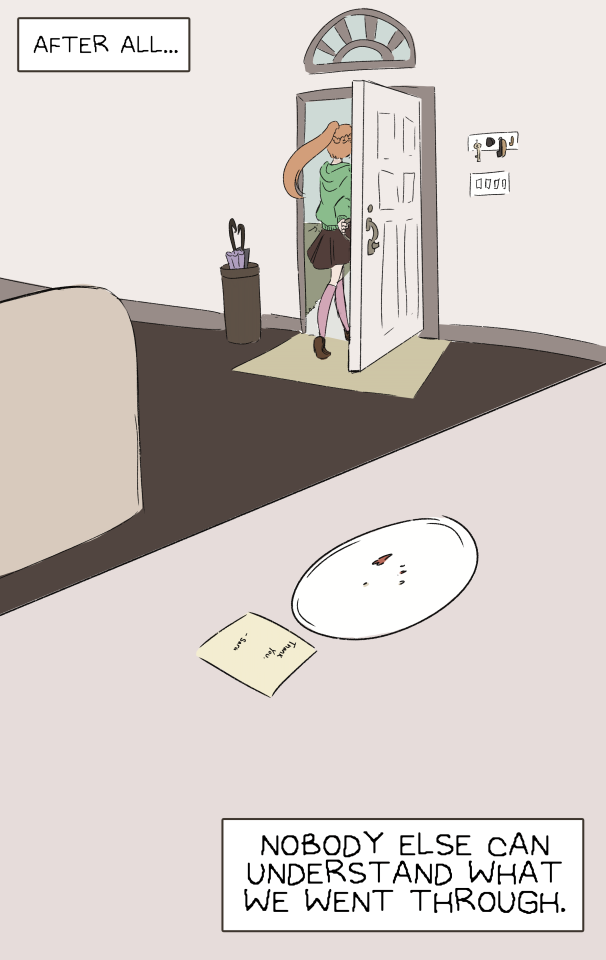
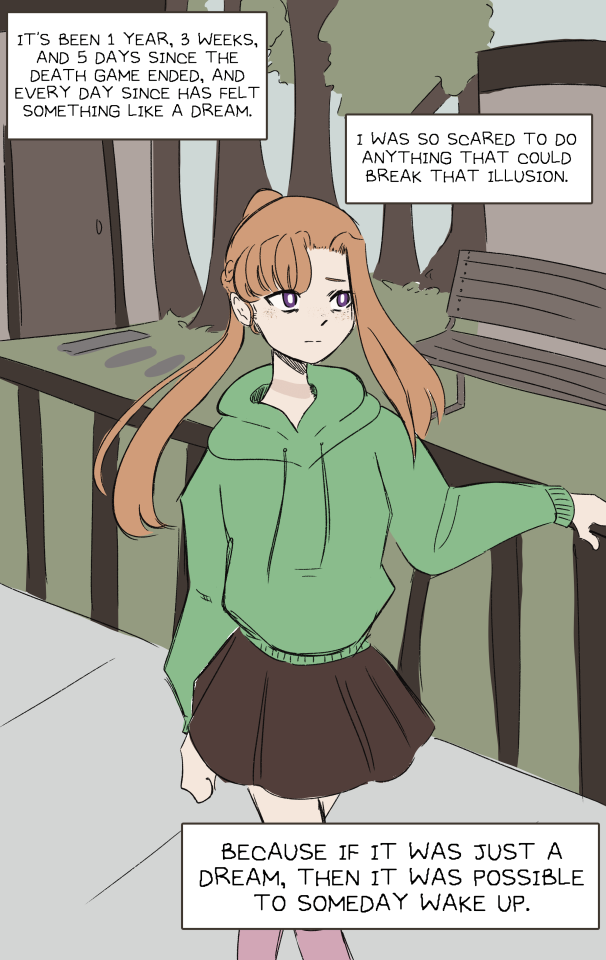
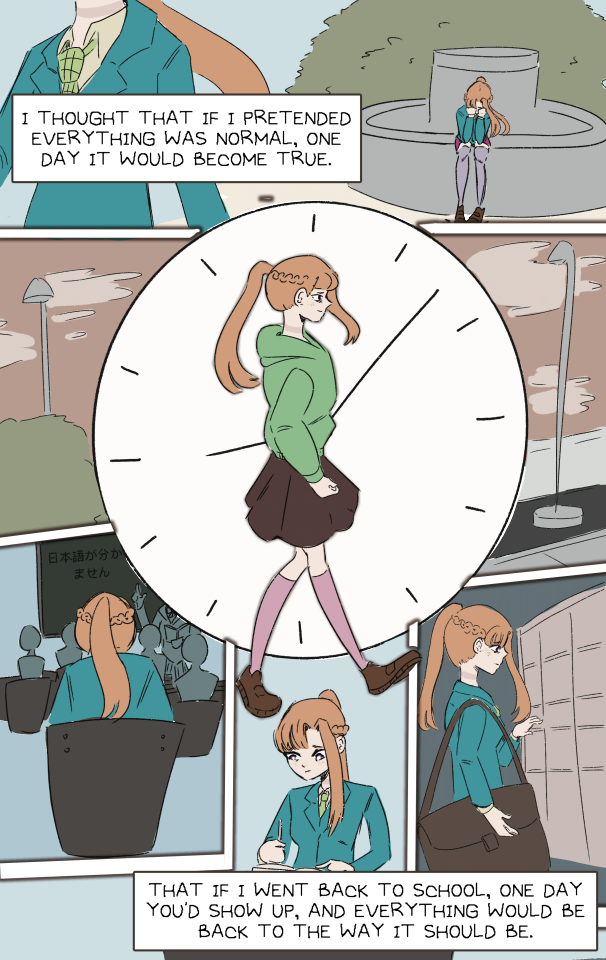
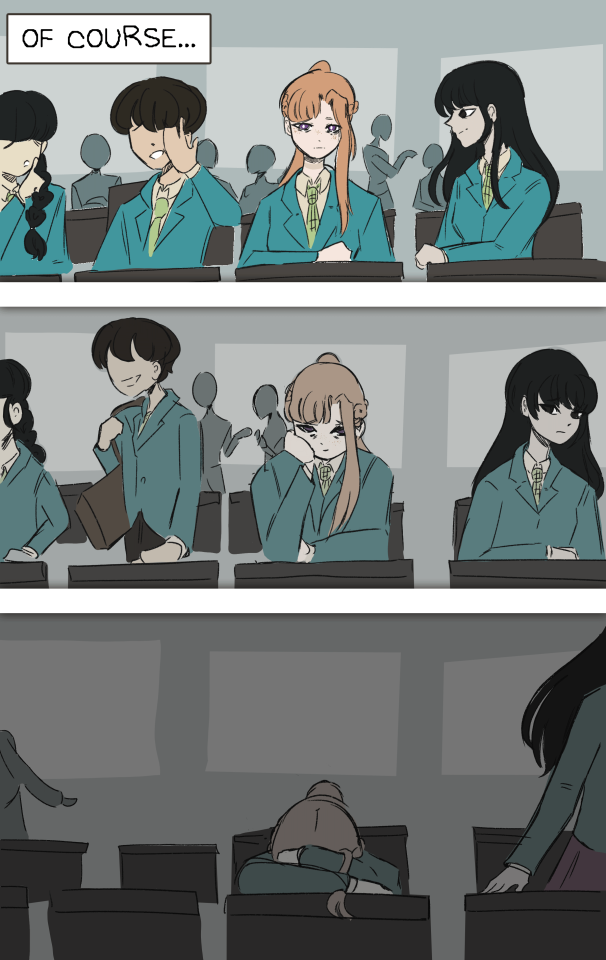
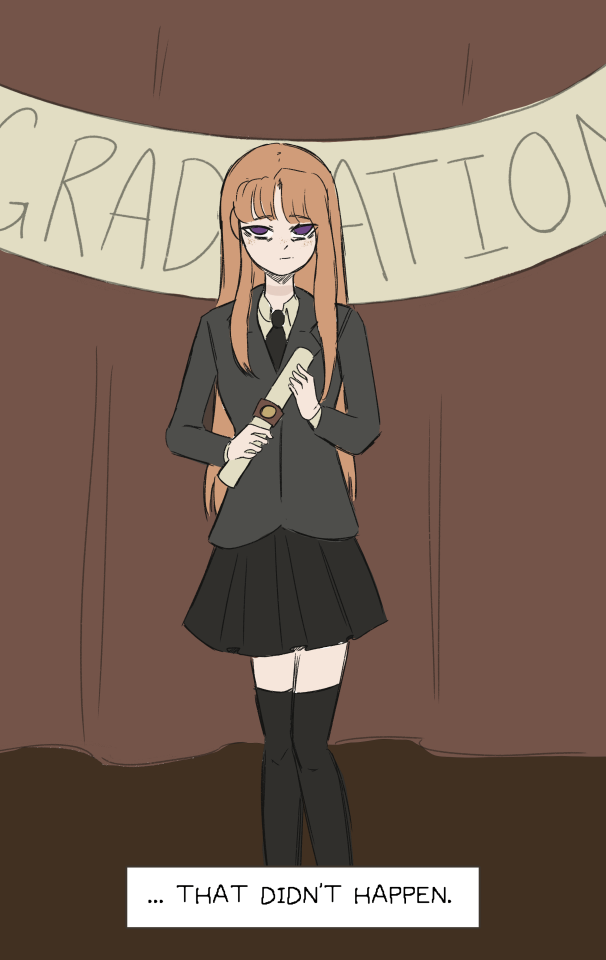
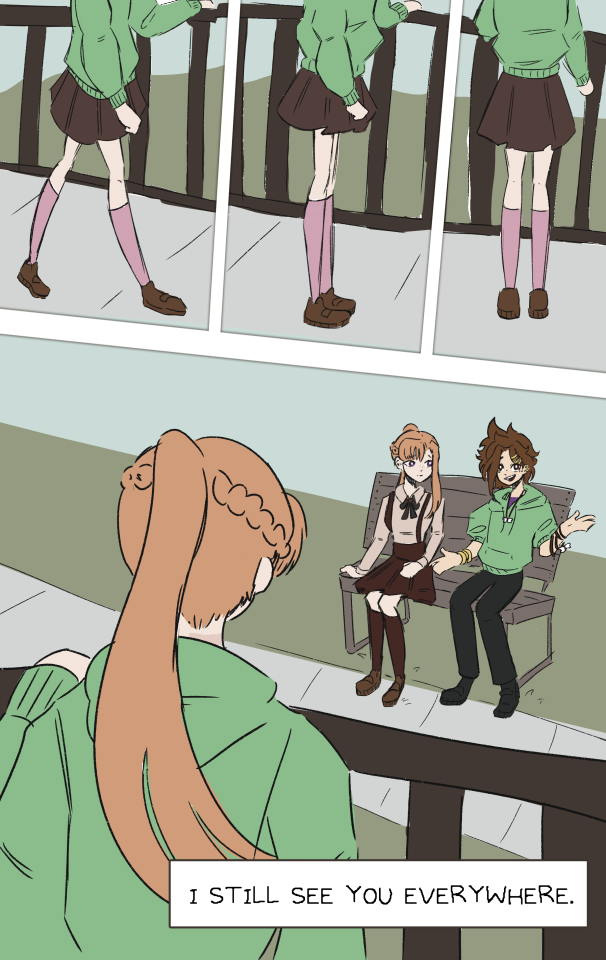
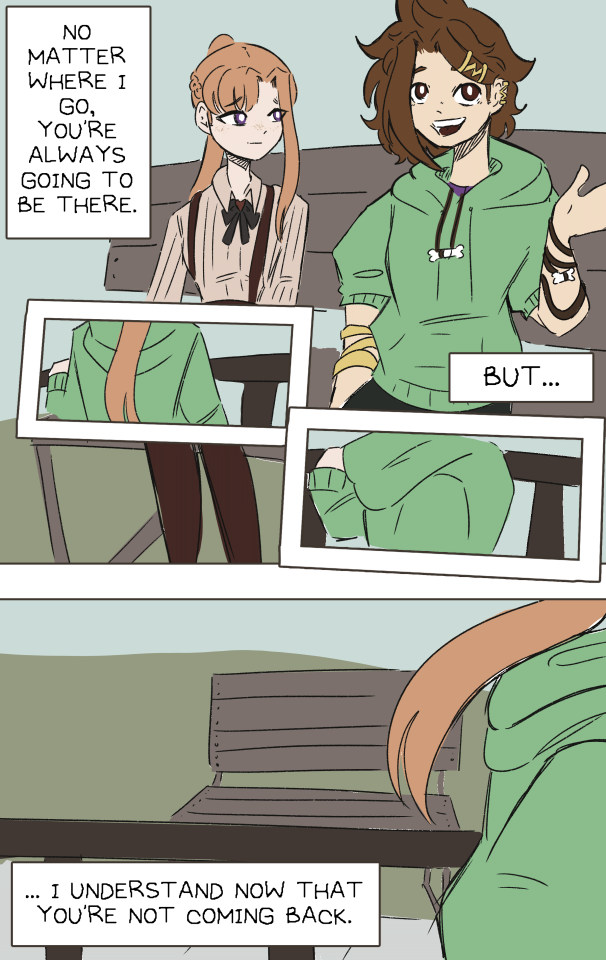
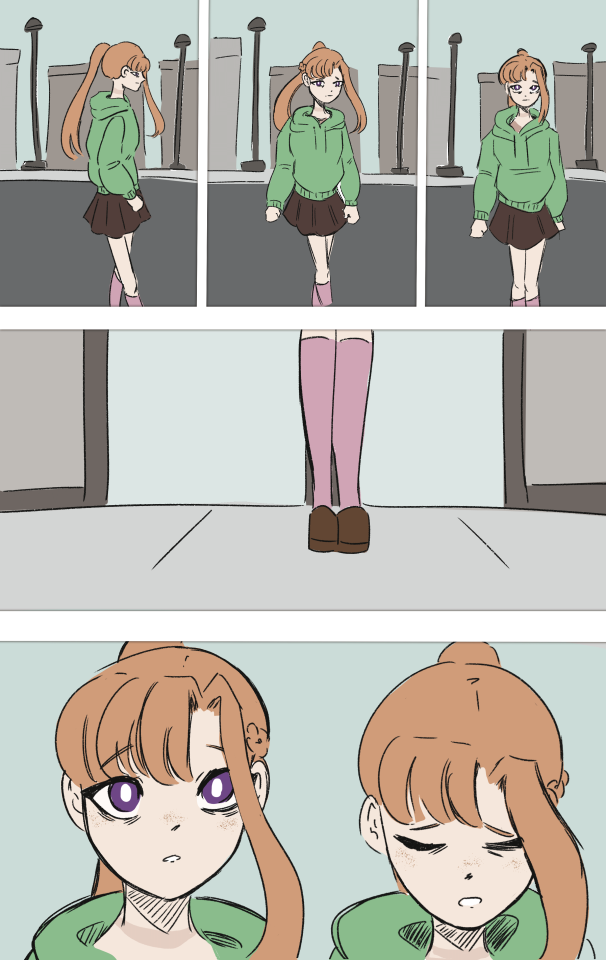
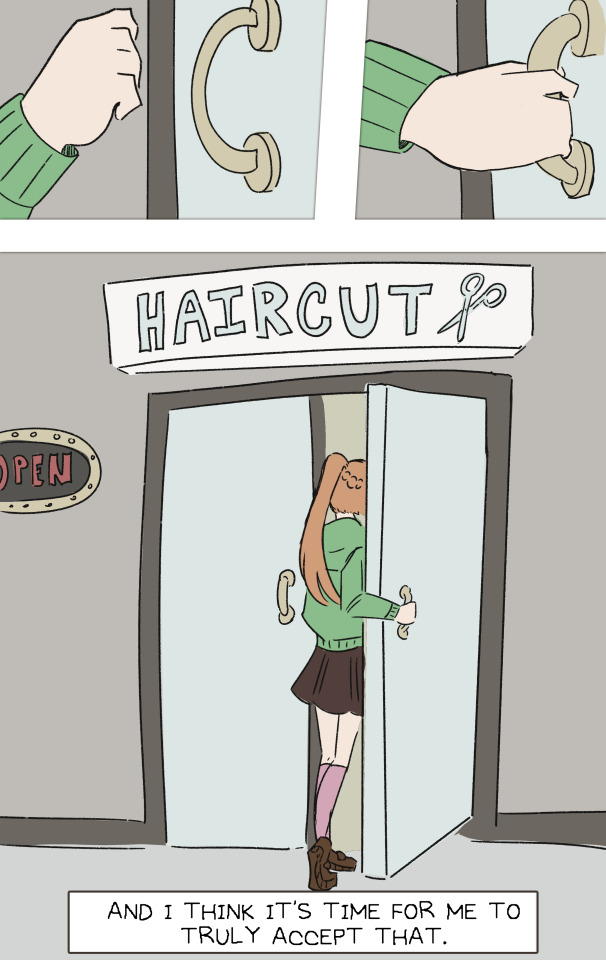
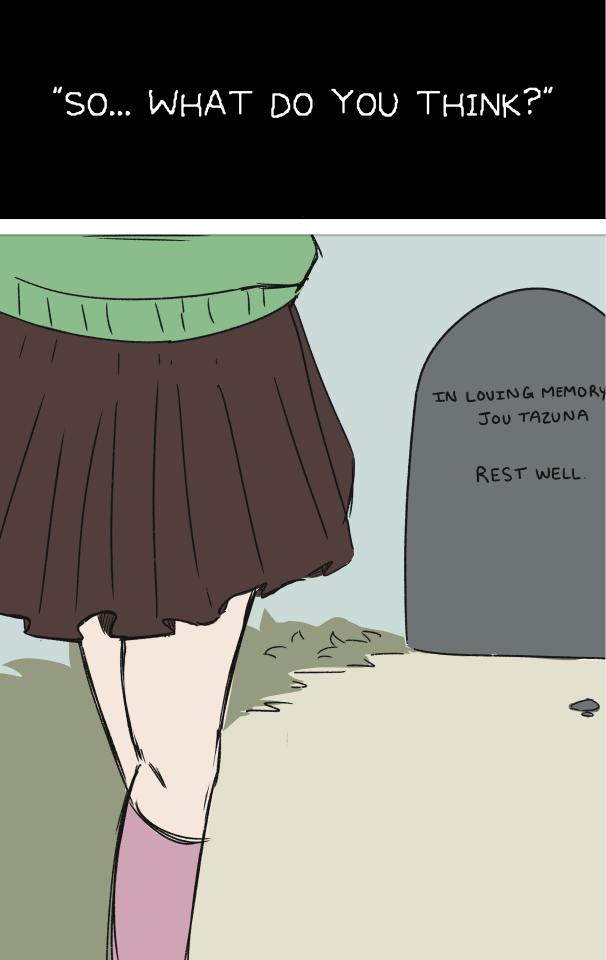
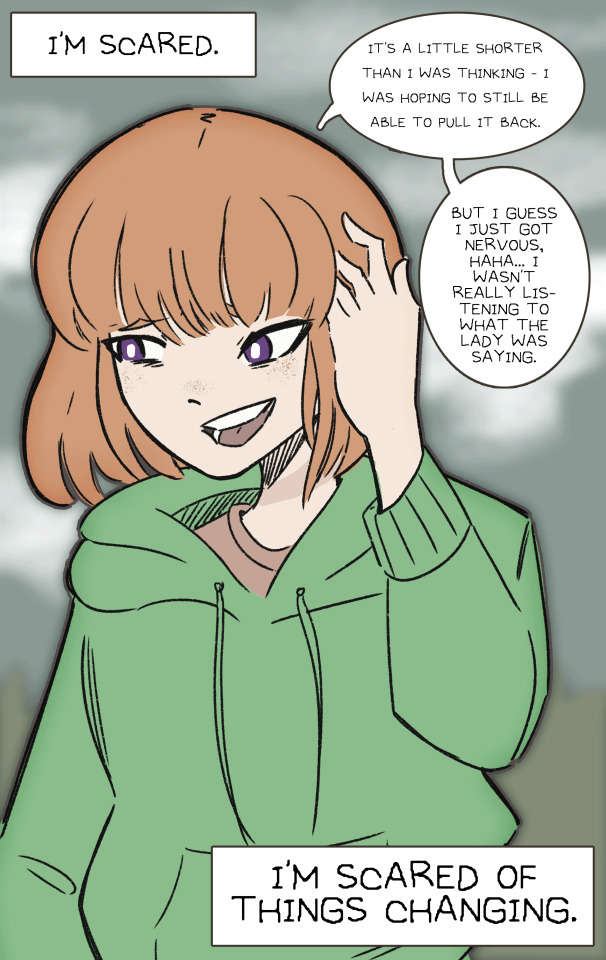
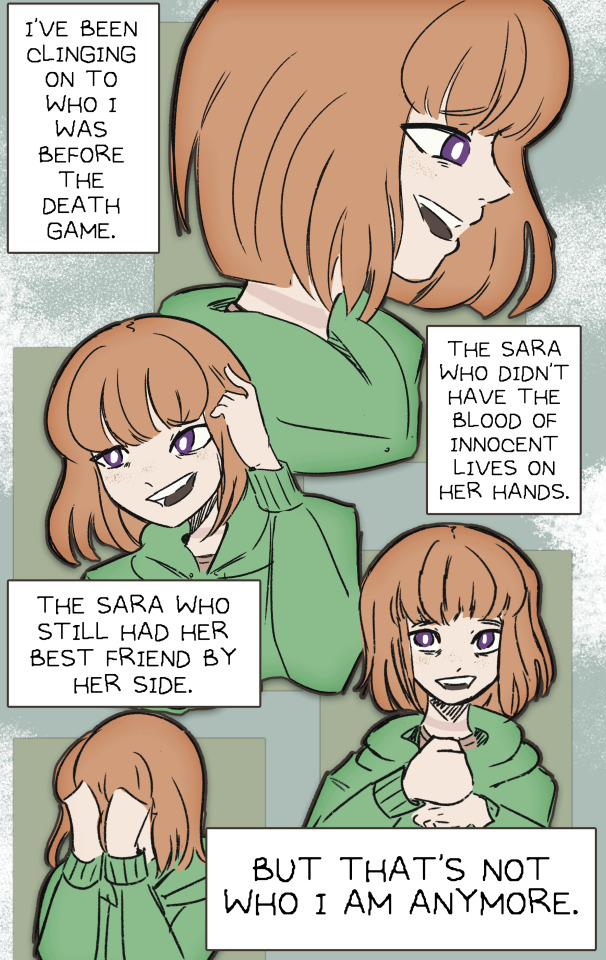
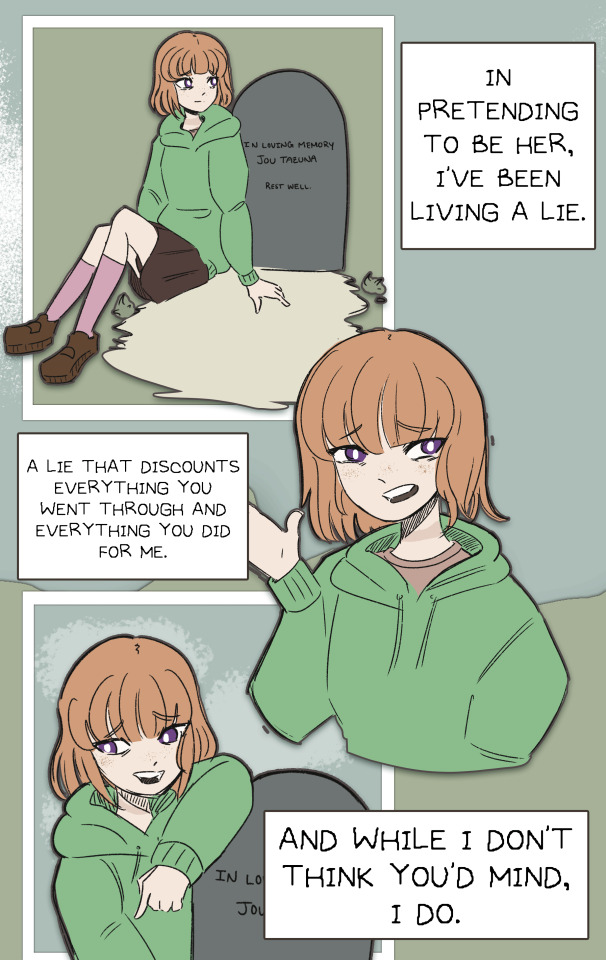
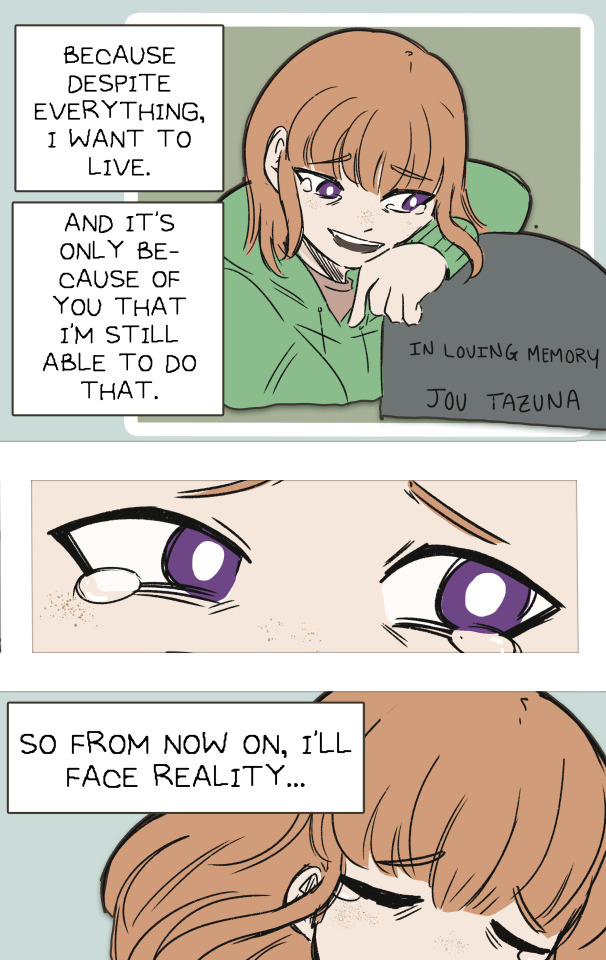
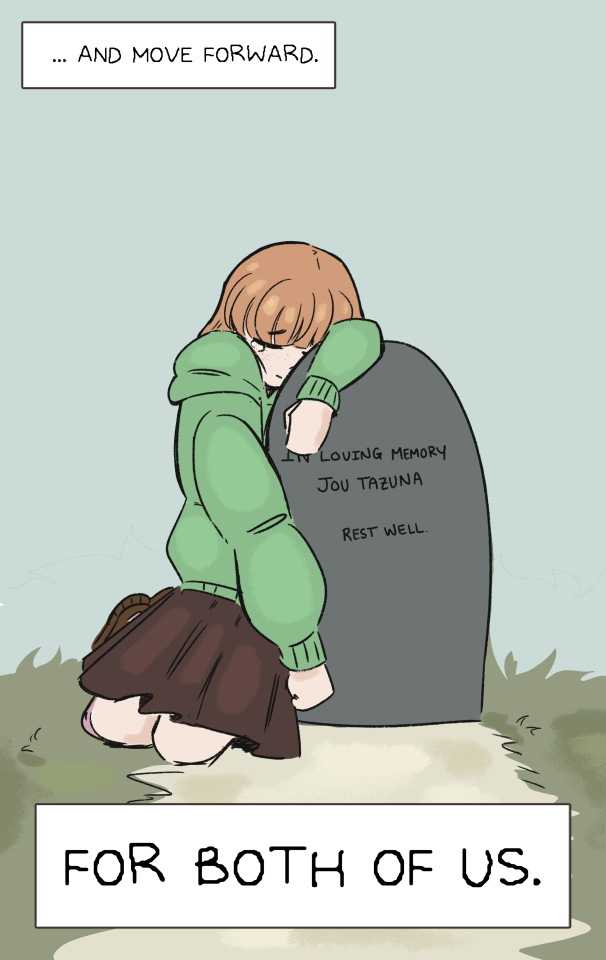
#your turn to die#yttd#yttd fanart#sara chidouin#joe tazuna#happy birthday sara#post-death game au#set in the Kanna/Alice lives route because that's personally my favorite#there are so many little hcs in this#sara will forever have freckles in my art#alice dyed his hair to match reko#also he's trying to get back into music for her#whether that's healthy or unhealthy is yet to be determined#Keiji is not doing so hot#angst#your turn to die fanart#ryoko isn't being mean i promise she just doesn't know how to help#yes sara is wearing joe's jacket#joesara >>>#I'm like 20 minutes late but I hope you enjoy regardless#god this took so long#I ran out of time to shade it I'm sorry </33#I hope you enjoy anyways!!#or don't#sorry for the angst on your birthday sara you deserve so much better
506 notes
·
View notes
Note
Hello, op! While I do find your reading of Kabru’s self sacrifice and how little he eats really good, im curious why you consider him the deuteragonist? He is a foil to the protagonist yes, but still a supporting character.
I think its pretty clear Marcille is the second most important character in DM, and her story has much more weight than Kabru’s.
Hello! I've mentioned this on my blog before, but I actually consider Marcille and Kabru to both be deuteragonists to Laios's protagonist. I just wasn't talking about Marcille in that post.
Technically this term is meant to be used in playwriting, and the Greek tradition at that, so I'm playing a little loosey goosey with semantics and my argument would sound different if I were writing an academic paper. But this is tumblr dot edu and I'm trying to get a point across on my little blog, and part of the idea of a deuteragonist is that they support the protagonist. "Secondary main character who has their own importance in the narrative while bolstering the protagonist" works well enough for my purposes.
I think Marcille and Kabru are both playing specific and complementary roles to Laios. Marcille is at his side, facilitating the A plot: namely, "save Falin", which requires Marcille's magic, and then Marcille's method of resurrection ropes Thistle in, so the continuation of "save Falin" necessitates confronting the Dungeon Lord and conquering the dungeon (the B plot).
Kabru only intersects with Laios, but he is tied from the beginning to the B plot- and with dragging basically everyone else into it. Actually, the fact that he brings in this extremely loaded B plot despite only having brief face time with the protagonist should be seen as significant. In a sense, Kabru represents the surface world and all its concerns.
Before I talk about that more, I want to continue with the complementary line of thinking and point out that Kabru and Marcille have very similar background motivations.
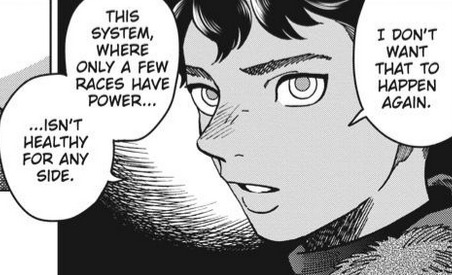

Laios wants to save his sister first and foremost, and it's only along the way that he starts to consider what he'd do with the responsibility of Dungeon Lord. Coming to the conclusion that he wants to create a home for disparate peoples to live in harmony has connective tissue to both Kabru and Marcille's desires.
Marcille is the only one in their party who starts out with a greater motivation other than saving Falin (Izutsumi is a special case, but she's ultimately along for the ride), one that she keeps hidden for a long time. Because she is a mage, and because she is driven by a very personal tragedy (my dad died; I am terrified of outliving everyone), she is looking for a miracle to bring the different races closer together.
Kabru comes from a background of personal tragedy as well, but it's also a far greater, more political tragedy than just the death of a parent. It is not a coincidence that Kabru is a brown boy from an exploited region that suffered despite and because of military intervention from a first-world power, nor that he was adopted by a white woman whose coddling/dehumanization of him represents the paternalistic oversight of these world powers.
Thus, Kabru's motivations are both personal and political: if they, the short-lived races, can finally access the secrets of the dungeons, then not only can they have agency in stopping tragedies like Utaya's, but it will also give them a greater power of self-determination.
Marcille and Kabru have both correctly identified and set themselves against a problem that is greater than saving the life of one girl, greater even than sealing this one dungeon.
Despite Marcille's hopes, there is no grand magic solution to this. Only small, slow, backbreaking, ordinary solutions, the kind you labor over in kitchens and bedrooms and throne rooms and meeting houses and hearths and negotiation tables. The kind you run a kingdom with.
There is a reason why Dungeon Meshi ends with Marcille and Kabru on either side of Laios's throne.
Okay: back to Kabru (under the cut).
I've talked about this a little before, but I'll reiterate here: I consider Kabru to be the counterweight to the back half of the story. In a very literal sense too, as he pulls the focus up from the depths to the surface not once, but twice. Dungeon Meshi builds itself on the premise that the traditional "dungeon" must function as an actual ecosystem, and the monsters in it are biological actors in that ecosystem and not merely magical obstacles independent of their environment. The first couple dozen chapters are focused on this. Like regular animals, monsters have needs and instincts and unique behaviors, and they can be killed and consumed as part of a food chain.
And then Kabru comes along and he reminds us that humans are also part of their own special ecosystem, with their own needs and instincts and unique behaviors, and that beyond the biological drive of the literal food chain there are also complex social issues influencing these behaviors (like capitalism). Tansu's visit with the governor introduced us to these ideas, but Kabru is the one who carries them.
The way he and his party break down Laios's party also serves an important function. I think most readers are so busy being shocked that Kabru is "so wrong" about our goofy boy Laios that they don't realize that he isn't actually wrong about anything (he's only missing the context of what drives Laios, which he admits to and is part of the reason why he pursues him). We've gotten only Laios's view of things so far, and Laios is pretty tunnel-visioned. The narrative, through Kabru, is telling the reader this is how our protagonist actually comes across to his community.
We like Laios because we are following his story from his inner circle. We know he's naive and struggles with people but that he has a good heart and is ultimately just a big silly guy who won't harm anybody if he can help it. But we only know that because we're seeing him with his inner circle, in his environment. Outside of the dungeon, Laios is anti-social to the point of rudeness; he misreads situations and misjudges people, he acts in ways that cause friction, and he accidentally aligns himself with people who make his whole enterprise look suspicious: a prominent half-foot community leader, a mysterious foreigner literally surrounded by spies, the disgraced daughter of a criminal who now has to shoulder the burden of her father's reputation, and an elf in a land where there are no elves. And they seem to be very good at what they're doing. Yet this whole time, Laios acts as if he doesn't care about profit or taking the kingdom, the only logical reasons why anyone on the Island would gather up such a party and throw themselves into this death pit day after day.
Yeah of course Kabru finds this suspicious and interesting. Of course people don't know what to make of Laios. This all reiterates the question that Zon the orc already raised: What will you do, Laios, if you defeat the Mad Mage? If you gain control of all of this? Can you be a leader? Laios himself doesn't know yet.
This is all necessary context for our protagonist and the journey he has to go on, and it's fittingly brought up by the most socially adept character, who is so concerned with human ecosystems and the bigger picture of the dungeon. There is a reason why Kabru, as a character, is connected to large webs of people as he moves throughout the narrative: his own party, Toshiro's party, the Canaries, the denizens of the first floor of the dungeon.
Kabru is responsible for bringing Toshiro down to Laios's party. Toshiro is not a big mover and shaker in the story itself, but his confrontation with Laios is a huge part of Laios's character arc. His detour down to the lower levels also allows Izutsumi to escape and join Laios's party later.
We also have this very important moment:
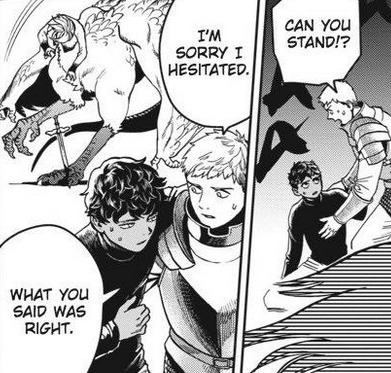
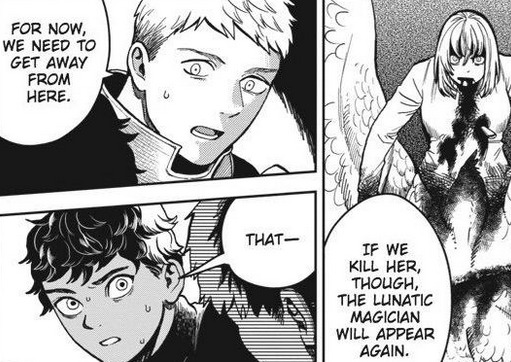
It shows the first inkling- to the audience, to Kabru, and to Laios himself- that Laios is willing to do a painful, necessary thing to protect other people, that he won't just allow them to become collateral for his sister/monsters. That he can listen, and that he can assess a situation beyond his personal feelings. Again, fittingly, big-picture-thinker Kabru is the catalyst for this.
And then, not content to leave him as merely a device for Laios's character growth, the focus slingshots back up to the surface, and we follow Kabru.
The Canaries were going to go into the dungeon soon anyway, and they were always going to stir up the crowd in order to lure Thistle to them. Unless Thistle had given up right then and managed to slip away, the story could have very easily ended here:
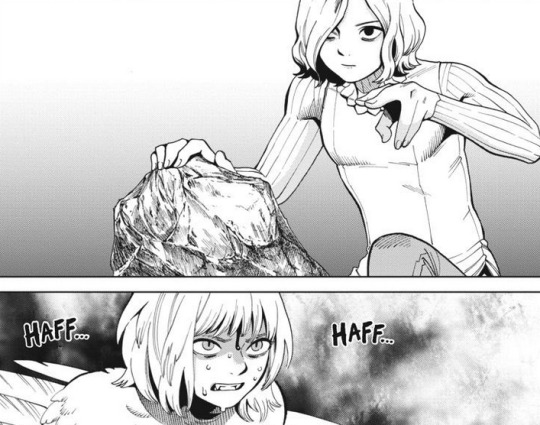
Falin, immobilized and surrounded by Canaries, would have certainly been killed, and there would have been no way to ever resurrect her. Thistle would have been neutralized. The dungeon would have been taken by the elves, and anyone they could get their hands on would have been imprisoned at best. And maybe the dungeon would have been managed safely ... or maybe something would have gone wrong, and more lives would have been lost. Remember: the Canaries arrived in Utaya one year before the tragedy.
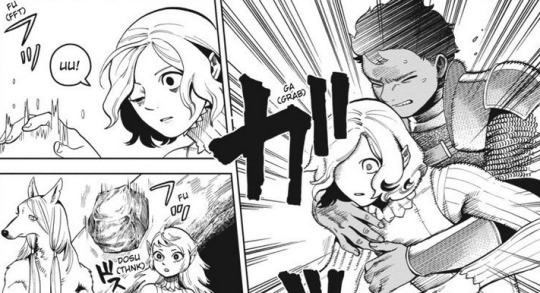
This is a huge moment that changes Laios's life forever, and he doesn't even know it. Kabru single-handedly keeps the story on course by sabotaging the Canaries, and he does it not just for Laios's sake, but for everyone's sake. For his friends and companions in the dungeon and everyone else outside it. Laios is a part of his motivation, a key player in Kabru's hopes, but Kabru has his own desires, his own agenda. He's trying to change the world. In a way, he succeeds. And while the Canaries might wish it were otherwise, as an entity in the narrative they are always anchored to Kabru's character. The two forces collide because of Kabru. The unsealing of the Winged Lion and Marcille's emergency ascension to Dungeon Lord happen indirectly because of Kabru.
While I have talked so much already that I don't want to give a detailed breakdown of it, I do want to mention Kabru's unique interiority as a character. That is to say: we see the inside of Kabru's head more than anyone else. Every character in the main ensemble gets their own moments of inner monologues or fifteen minutes in the limelight, but for Kabru, it's constant. He's always thinking, talking, narrating. His POV chapters always stand out for how first-person they feel compared to most others.
Notably, the only other character I could compare that to is Marcille, specifically during the dungeon rabbit debacle and her ascension afterward, which is when she really takes center stage as a character.
I hope I've explained my reasoning without becoming too insufferable.
To cap off my thoughts with a nod to my original post, I cannot stress enough how significant it is, thematically, that Kabru's relationship with food is the inverse of Laios's. It isn't just that Laios is the main character in a story about cooking monsters and Kabru happens to be his monster-hating foil. The artistic choice to deny the reader the visual of this character ever enjoying food, and only ever putting it in his mouth in situations where it hurts him, in a manga that gives so much attention to eating and the pleasures of meals, cannot be understated.
#Dungeon Meshi#Marcille Donato#Kabru#Kabru of Utaya#Dungeon Meshi meta#Dungeon Meshi spoilers#I started answering this at 10:30 AM but took several detours#mostly I was at work. some people shitpost at work. god knows what I'm doing.#I am so fucking sorry I did not mean for it to be this long. I had to EDIT THIS DOWN#paging malewifesband I feel like this does the trick wrt: Kabru's function in the narrative#of course I have more to say about he and Laios specifically (she threatened)#musings with Dea#I think I'll go back and add image descriptions but it's been eight hours and I need dinner!#and also to play FFXIV#dungeonposting#Dea's anonymous friends
507 notes
·
View notes
Note
Hi hi I love your art and everything aaaaa Grumbo is so cute!! I'm mainly a scarian shipper but gosh I saw your Grumbo and it's just *chef's kiss* please draw more!!!! (mayhaps you can draw some scarian in the future 👉👈 /nf)
Thank you so much !!!!!! <3 I loveeee drawing desert duo generally but I wanted to draw something shippy-er so I spent a while doing this >:3c

#q&a#scarian#hermitshipping#trafficshipping#desert duo#this isn't requests being open i just went a little crazy LOL#sorry this ask also took so long ! there are a bunch of asks i want to get to i'm just really slow ;A;#my art
283 notes
·
View notes
Text

Victory celebration for May the Fourth ❤️
#my art#star wars#star wars fan art#return of the jedi#star wars rebels#LETOSCRAWLS COMEBACK#let's all pretend it's canon also i didn't have space left for 3po and chewie IM SORRY 😭#this took me so long i'm so glad the nigthmare is over and i can move on with my life
3K notes
·
View notes
Note
43 + 45 for bucktommy 💕💕💕
43. falling asleep with their head in your lap +
45. running hands through hair
In the unflattering fluorescent hospital lighting, in a hard plastic visitor's chair, Evan looks wan. The light hits his face at odd angles, dragging down the deep bags under his eyes, draining his skin of its colour, its rosy vital glow.
Tommy has never seen anyone look so beautiful.
"Hey, baby," he rasps. He tries to clear his throat and ends up in a coughing fit that sets pain lancing through his body. Evan's eyes widen and in his rush to get a straw between Tommy's lips, he spills water on Tommy's chest.
"Hey, hey, it's good to see you awake," Evan says as Tommy sips his water. "How are you feeling?"
Tommy lets the straw go and tries to take stock. He looks down at himself - his left leg is in a cast from his hip down, as is his left arm. They both hurt in a dull, vague way, same as his ribs and his head. There's an IV line running through the back of his right hand. His stomach turns a little at the sight so he looks away. He's not great with needles.
"It hurts," he says, frowning. He looks back up at Evan, who plasters a fake smile on his face. "What happened?"
Evan takes his hand, carefully, cups Tommy's fingers between both of his hands without jostling the IV. "You don't remember?"
Tommy shakes his head and decides never to do that again when it makes the room spin.
"You were- there was an accident," Evan says, stroking his thumb down the back of Tommy's index finger. "You, uh, you got hit by- by a car."
"Oh." Tommy looks into Evan's eyes. They're so pretty. "Really?"
Evan smiles a little - this one is real, Tommy can tell. "Yeah. What's the last thing you remember?"
Tommy thinks, tries to grasp the memory of what he was doing before he woke up. It's hard to hold onto any one thought - it's like chasing bubbles. The second he gets his hands on one, it pops, gone. Evan likes to blow bubbles for Jee. She runs through them, twirling until each and every one is gone, and asks again, again! It's so cute it makes Tommy giggle.
"What's so funny, huh?" Evan asks. He's smiling still, kind of, but he looks confused.
"You're so cute," Tommy explains. He knows Evan will get what he means. Evan always gets what he means. Case in point: he laughs, which makes Tommy smile even more because he loves that sound.
"You enjoying that morphine, babe?"
Tommy almost shakes his head - but then he remembers he shouldn't. "I don't like morphine. It makes me nauseous." He pulls his hand out of Evan's hold and presses his thumb to Evan's birthmark. It fits his thumb so perfectly. Like Cinderella's shoe. "I like you, Cinderella."
Evan laughs for real, then, big and loud, and Tommy feels proud of himself. It's his job to make Evan happy. His hand is dislodged, but he raises it again, landing it in Evan's hair. It doesn't feel like gel, like he's used to, all he feels are Evan's soft curls, and he could get addicted to how they glide under his fingers. He pulls Evan closer, then down, so he's resting his head on Tommy's hip, and Tommy doesn't have to lift his hand so high to touch his hair. Evan's still smiling up at him.
"You look tired," Tommy says. Evan proves his point by yawning.
"I'm fine. You're the one who needs his rest." Evan lays a hand on Tommy's knee. He likes it, he always likes when Evan touches him.
"You can sleep," Tommy says. He traces his thumb across Evan's dark under-eye, making his eyelashes flutter, and on his way back to burying his fingers in Evan's hair he presses his thumb into Evan's birthmark again. "I want you to."
"Will you sleep if I do?"
"Yeah," Tommy lies. He thinks Evan sees through him, because Evan knows him so well, but he still closes his eyes and nuzzles against Tommy's hip.
Tommy focuses on brushing his fingers through Evan's hair, letting his curls bounce back into shape before he reaches them again, following the soothing rhythm of Evan's breathing. He loses track of time; it drips, slow like the motion of his fingers, slow like his thoughts that remain out of reach, and before he has a chance to notice it, his own eyes have grown heavy.
He falls back asleep in pain, still - but with Evan's head a welcome weight on his hip, Evan's hand on his knee, his fingers tangled up in Evan's hair, it's easy to ignore.
#bucktommy#ask tag#my fic#starryeyedjanai#I'M SORRY THIS ONE TOOK SO LONG but i'm really enjoying spreading these out and taking my time with them#thank you for your patience!!!#also open call to anyone who wants to keep sending these in! it's a nice mini project i like having!#prompted fic
232 notes
·
View notes
Text










MINHO in 5 STAR ERA for @linoyes
learn more about getting a gifset for gaza here!
#lee know#minho#stray kids#skz#bystay#createskz#a9gifs#gifsforgaza#*gif#*ccarly#*minho#*carly:minho#i'm sorry this took so long my mental health forbade me from working on it for some reason .#i think it could've been better but it also might've taken me another god knows how long#if i were to improve it kalsdlsfdlk so i wanted to just finish it finally <3 hope u like it and thank u for requesting!!
192 notes
·
View notes
Text

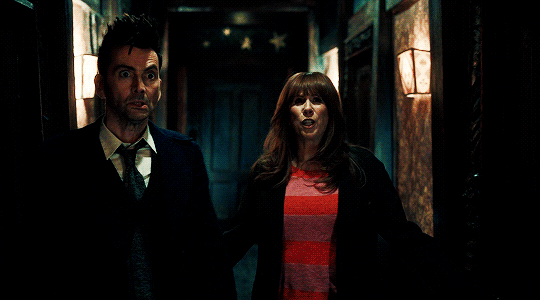

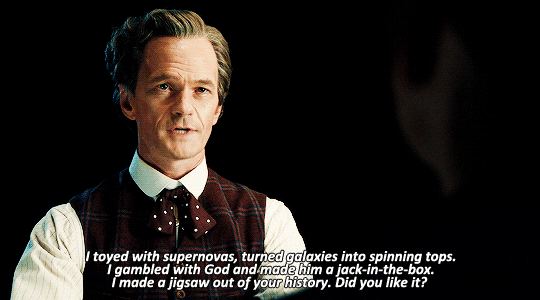
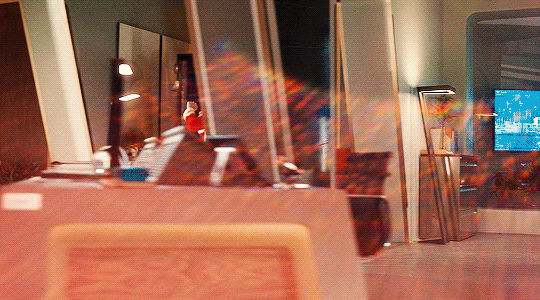
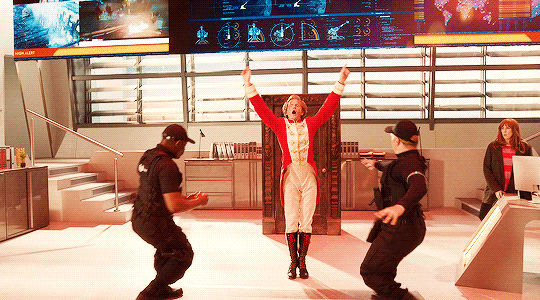
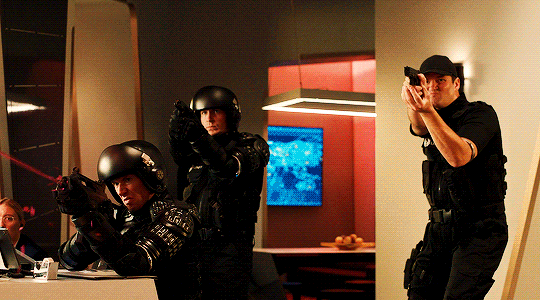
#mine#doctor who#dwedit#david tennant#catherine tate#neil patrick harris#jemma redgrave#ruth madeley#here you go anon!!! i'm so sorry it took me so long#i realized i probably should have also added captions about each of his powers/abilities in the gifs...#also i've had spice up your life playing in a loop in my head all week
681 notes
·
View notes
Note
Hello! I just saw your latest post and you might have been referring to my ask if it was the one about Ratiorine's differing philosophies or of what philosophies they abide by (existentialism, absurdism, etc) then that's me! If you weren't referring to that I apologize for the confusion. Sending it off anon this time so maybe it doesn't disappear 🥲
Sorry for the ask disappearing the first time; I'm not sure what happened, and I was so sad because I had been carefully holding on to it to answer it! I'm glad you were able to resend.
I do have to say first that philosophy is not my area of expertise, so there may be much more qualified philosophy buffs out there who can answer this more accurately than me, but I'll give it a go with my personal understandings of the characters:
First, Ratio is the easier of the two I think. As many people have said, he's a good fit for existentialism. His entire shtick is basically believing in the power of the individual to improve and enrich their own life, to fight valiantly regardless of the hardships imposed by their life's circumstances, and to make themself into a better person by their own choices.

It's important to underscore that this means Ratio believes in self-determination, in the idea that people's lives are not foreordained but are actually actively shaped each day by personal decisions. Therefore, people have inherent freedom to decide the course of their own lives by accepting what they approve of, refusing to accept what they disapprove of, and harnessing their own individual power to ultimately achieve self-actualization.

Essentially, Ratio works under the impression that life is not guided by something as intangible as destiny, and no matter where you start off in life, what ultimately happens to you is within your control (or at least within the control of whoever controls you). This is likely a small part of why it grates on him so badly that he wasn't recognized by Nous, because the fact that one can dedicate everything to a goal and still not achieve that goal runs contrary to his central philosophy.
If he believes that people have the power to determine the course of their own lives, then what does it say about him, who fought so hard to do exactly as he claims even idiots can do--seize control his own fate--and yet didn't succeed? Are there some things outside of man's power? It's enough to make even a renowned doctor question himself, and Ratio decided to come out on the side of "It's a personal failing, not a flaw in my philosophy." He literally said "Skill issue" to himself.

Changing tack a tiny bit here, I think it's also important to emphasize that there is a difference between existentialism and nihilism even though these philosophies dovetail. Again, I'm not an expert in philosophy, so my understanding is very limited, but the basic idea of existentialism is that "existence comes before essence"--that is, things start as a blank slate and gain nature and meaning after the fact. We are not created by some grand design, nor is there any inherent "purpose for living." Things just exist because they exist.
This is where existentialism intersects with nihilism, at the starting point that existence is inherently meaningless. But, in my personal opinion, nihilism as a philosophy fails to move beyond that. Pure nihilism is ultimately self-defeating because it leaves us with no motivation to commit to growth. It's a philosophy antithetical to the continuation of life as we know it. Existence is meaningless and any meaning you personally derive from existence is also meaningless, so why bother attempting to derive any meaning at all? This complete apathy is the Device IX that Star Rail paints as so dangerous.

And Ratio is not this way at all. His philosophy absolutely reaffirms that life can have meaning, so long as people create that meaning for themselves. He simultaneously asserts that anything that people create is not meaningless ...which basically means that meaning itself cannot be meaningless. (If that makes any sense to anyone.)
Frankly, I would argue that this philosophy may be a core part of why Ratio has not been recognized by Nous so far, rather than simply his "being a good person." (Nous is a robotic AI super-computer, why would THEY care about the presence or lack of human empathy?) Ultimately, Ratio's central philosophy about people being capable of determining their own fates and purposes also applies to his understanding of knowledge--knowledge is not something which is inherent in certain beings from birth or limited to the purview of the "special" (geniuses), but is attainable by all people. People are not "born talented" or "born untalented," they are simply "educated" or "uneducated," with the only barrier between these categories being one's own personal willingness to change. The mundane can become the divine--if they work hard enough at it.

Thus, knowledge is not wealth to be hoarded, but a currency to be spent to enrich other members of humanity.
(By the way, completely random aside--it also surprises me that everyone relates Ratio to Alhaitham from Genshin when they literally have such a glaring fundamental discrepancy in their understanding of the concept of wisdom... But anyway, back on topic!)
Ratio may (sort of) respect the members of the Genius Society, may recognize their incredible knowledge and abilities, but at the heart of the matter lies a single all-important question: Does Ratio even really believe in "genius" as a distinction (other than as a concept to insult himself)? Does he truly believe there is barrier between brilliance and idiocy that "ordinary people" can never cross?

He speaks convincingly about geniuses being different from "the ordinary," but if his core belief is that people have the power to pull themselves up out of despair and achieve greatness through effort and self-development, rather than some form of luck or god-given talent at birth, then... do born "geniuses" even really exist? Is there really an insurmountable difference between brilliant and mundane?
If knowledge is the equalizer of all sentient beings, do we not all have at least the initial capacity to become geniuses?
I personally think this central distinction about the capacity for knowledge among all humanity is the actual deciding factor in Ratio's rejection from the Genius Society, because, at the end of the day... how do you become a member of the "Genius Society" when you fundamentally reject the distinction of "genius" as an exclusive category from the start?

Ratio wants to share knowledge and uplift everyone (even if he thinks most people are starting off at the rock bottom known as idiocy).
His mission is diametrically opposed to the concept of a "Genius Society" in the first place.
He wanted in to the cool kids club because he desperately craves validation and acceptance, but the philosophical values of the Genius Society are ultimately incompatible with his own. In short, he would have to cease to be "Veritas Ratio" to succeed in joining the geniuses.
Okay, okay, back to the original point again, and just one more note about Ratio: Even though existentialism also goes hand-in-hand with absurdism, I don't think Ratio is far enough down the philosophical rabbit hole to believe in the wider definition of absurdism. Although I think he does agree with the inherent meaninglessness of existence, I don't think he views existence itself as truly irrational and the universe as as manifestation of unknowable chaos. I think he'd at least like to imagine that there are some ontological principles and inherent laws governing the operations of reality, and I think he does believe that certain things can be predicted with the application of enough thought... He certainly seems to believe in some form of "objective truth," at the very least.

I think he'd at least like to believe the universe is semi-orderly, even if he might deep down admit this is also wishful thinking.
So, to me he reads as a strong metaphor for pure existentialism, with deliberate rejections to both nihilism's apathy and absurdism's lean toward solely subjective reality.
PHEW, this is already long and I still have a whole other character to talk about... I had more to say about this topic than I thought. Sorry for the long read!
Anyway... Aventurine.

I've seen all sorts of things thrown around for Aventurine's philosophy, and while I think he does inherit a bit of Acheron's absurdism by the end of 2.1, I actually don't think Aventurine is an absurdist, an existentialist, or a nihilist.

I think Aventurine is a struggling fatalist.
He doesn't like it. We see him actively question it, but ultimately, he does come back to the concept of destiny over and over.

First, I think it's important to draw a clear distinction between Ratio and Aventurine: Ratio's existentialism is a philosophy that technically works even in a theological vacuum. Nous doesn't have to exist for Ratio's philosophy to function. Ratio's belief in the self-determination of humanity is, in fact, somewhat opposed to belief in aeons in the first place, and only works because technically the aeons of Star Rail used to be human (or were originally human creations). It's essentially an atheist viewpoint.
But Aventurine is a religious character. Like, he's just... religious. That's a fact about him. Even though we do hear his doubts, at the end of the day, he actually believes in Gaiathra, and believing in a omniscient supernatural being that is not human in origin (is from outside the aeon system) comes with a whole set of philosophical foundations that most aeon-worshipping characters just don't have in Star Rail. (Sunday is the obvious exception here, by the way.)

Kakavasha's like the one practicing pagan in the middle of an atheist convention. Awkward.
Being more serious: Religion requires faith. Faith requires the ability to believe in things you cannot verify with empirical facts. To believe in things you can only feel, never see. The belief that a goddess is watching over you, blessing you, and guiding you requires you to also accept the idea that events in your life are not always in your own control--that some of what occurs to you is decided by powers beyond your comprehension.
In essence, faith requires belief in fate. And that leads to fatalism.


No matter how much he doesn't like it, no matter how much we see him struggle with it, Aventurine does actually seem to believe in the concept of fate. He believes that some events in life are destined to occur, that some things are outside of individuals' control, and that ultimately not everything can be changed.
This is the dead opposite of Ratio's mindset: No matter how hard we fight, how far we push ourselves... in the end, sometimes people fail. Sometimes the only answer to our endless struggles is that we die, as we were destined to, before ever achieving the greatness we sought or the futures we were promised.

As an aside, I don't think faith or religion are necessarily the only factors connecting Aventurine to this particular philosophy either. Even removing theological aspects from the conversation, his extreme focus on the gambling aesthetic suggests a strong connection to fatalism too--if not a goddess, then one's fate may as well be in the hands of luck itself, of the whims of the rolling dice--or the push and pull of "powers that be," those figures of authority in the room where it happens, who make their shady deals according to preset rules and expectations, every bet resulting in an ultimately predictable outcome.
(He keeps gambling and gambling, hoping that he'll get a different result than the one he knows is inevitable...)
This is, of course, an inherently pessimistic mindset, a perfect dark-mirror to Ratio's deep-down optimism. Fatalism puts humanity into a position of powerlessness. All hopes and dreams are given over to the goddess, by whose judgment and whims the actual events of one's life are decided. Pain and poverty are inevitable trials. Suffering and death are foreordained.

And yet Aventurine has to cling to this, as much as he doubts it, as much as he hates the idea that things in his life are beyond his power to control.
Because if fate doesn't exist... If it wasn't destiny, if the tragedies of his life weren't trials from the goddess, if things weren't supposed to go this way... Then every single thing in his life really is meaningless. Everything he suffered, everyone he loved and loss, his mother's and sister's sacrifices, the torment he went through--just sheer bad luck. All of it, completely and utterly meaningless.


How can you convince yourself to keep living, in the face of such supreme and all-encompassing Nihility?
This is the central struggle of Aventurine's character, the actual mental and emotional journey we see him undertaking from 2.0 to 2.1. He is literally on the precipice, swinging between a viewpoint that he hates--his fatalistic belief in destiny--and an entirely self-defeating philosophy--nihilism--whose only possible final outcome is suicide.

This is what his talk with Acheron at the end of 2.1 is all about. This is how she saves him. In that final cutscene, we witness Aventurine reach a mental compromise, managing to finally reconcile his necessary faith in the concept of destiny with the reality that life may truly begin meaningless--but beginning meaningless does not mean staying meaningless, and believing in destiny does not bar you from making your own choices or finding your own purpose in life.
Later on in Penacony's story, we literally see Acheron use Ratio's philosophy to reject the same nihility that crept into Aventurine's:


Acheron wards off nihility's apathy through an absurdism all her own, but one which manages to enclose both Ratio's and Aventurine's otherwise incompatible mindsets: We have no way of ever knowing for certain whether the events of our lives are fated or mere nonsense. We have no way of knowing if our choices are our own or foreordained. But we don't need to know this to find meaning and value in them. Whether life is nothing more than unpredictable chaos or a predetermined pattern of cause and effect, what matters is what you make of it.

Ultimately, I think that this post has really helped me recognize just how well Aventurine and Ratio work as philosophical foils.
They really are perfect opposites.
Aventurine's fatalism is deterministic, while Ratio's existentialism is self-deterministic. Aventurine's philosophy is inherently pessimistic; Ratio's is inherently optimistic. Ratio's philosophy operates on a core belief in the freedom of humanity to decide their own paths in life, while Aventurine hates but does ultimately believe that people aren't really in control, that even if no gods are guiding us, we can't rise above our own natures. Ratio's philosophy makes meaning from growth; Aventurine's makes meaning from loss...
And they both struggle with fundamental doubts in their own philosophies, core questions that are directly tied to their own lives. Aventurine worries that his faith might be misplaced, that destiny might not exist, and that everything he suffered might have been in pointless, empty vain. Ratio faces the crisis of recognizing that his core belief in the power of humankind to determine their own paths and make their own meaning might not actually apply to everyone--because it doesn't seem to apply to himself.

It's literally only by bridging this philosophical binary with Acheron's anti-Nihility absurdist rhetoric that we can reach some sort of healthy outcome. That's why it takes both Ratio's note and Acheron's comments to finally lead Aventurine to acceptance. Ratio probably needs a little bit of Aventurine's "If you didn't make it into the Genius Society, there's got to be a reason" mindset to finally reach some peace with his situation too.
I'm not even a philosophy expert and even I can see that there's really only one takeaway here: These two characters were totally written with each other in mind.
Aventurine and Ratio need each other on core metaphysical levels! 😂

It's so good guys. You can't see it, but I'm making chef's kisses, I promise.
#honkai star rail#aventurine#dr. ratio#ratiorine#aventio#well the implication is there at least#character analysis#honkai star rail meta#philosophy#long post is long#this took so long oops I'm posting at 2am#entirely unrelated but innenofutari#you are very based for having a Princess Tutu quote in your bio#that's the most important thing I could tag this post with#actually#also if my philosophy understanding is all wrong I'm sorry#not gonna lie I dated a philosophy major in college soooo#that should tell you everything you need to know about my feelings toward philosophy
175 notes
·
View notes
Text
Okay, let's finally talk about EPIC's Apollo
I feel very compelled to say, first of all, that I do not dislike Epic. In fact, I am very fond of Epic and have been following its production and status very eagerly! I attend all the launch streams, I watch all of Herrans' update videos; I am, at the end of the day, a fan and I want it to be known that my words are spoken out of love and passion as much as they are spoken from a place of critique.
So really, what my problem with Epic's Apollo?
In the briefest possible terms; the choice to have Apollo be defined by his musical aspect in God Games is thematically strange. And not in the 'oh well in the Odyssey, Apollo was important to Odysseus and his family so it's weird that that wasn't kept in Epic' strange, strange in the sense that Odysseus' character arc since My Goodbye has been getting more and more obviously Apollonian and so it is positively bizarre that when we get to meet Apollo, the god seems entirely disinterested in him and his affairs. So much so that he is not even defined by any station that would indicate that he has been watching over and protecting Odysseus and his family.
What do I mean by 'Odysseus has been following an Apollonian arc'? I'm so glad you asked!
Remember Them is the last song in which Odysseus explicitly uses his sword until Mutiny where he must use it to defend himself against Eurylochus' blade. He uses it to help enact the plan to conquer Polyphemus and, due to Polites dying in that battle, Polites who wished for Odysseus to put the blade down entirely and embrace a post-war life, Odysseus also retires his sword. This is an action that symbolically separates him from Athena - and the image of Odysseus as a traditional warrior set for him in Horse and Infant - as much as My Goodbye physically separates him from the goddess and her war-ways - from this point onwards, Odysseus will no longer be leaning on Athena's wisdom or methods to solve his problems. Likewise, he will no longer be able to rely on her protection.
Odysseus thusly solves most of his upcoming problems through diplomacy and avoidance. He approaches Aeolus - a strange and ambiguous god (both in gender and in motivation) and appeals to them for help. Circe too, he approaches not with wishes to conquer or for revenge, but for the safe returning of his men and an alternate way forward. In all of these scenarios, there is some Apollonian element which is subtly interweaved alongside the influence of other gods; it is with a bow and arrows that Polyphemus' sheep is slain (and thus it is this Apollonian element which is at the root of Odysseus' spat with Poseidon), it is a vision of Penelope that warns Odysseus that his men are about to open Aeolus' wind-bag, Circe's peace offering to Odysseus is to refer him to a prophet of Apollo who has since died.
In this way, Apollo is walking alongside Odysseus for all of his journey after Athena departs - even in the Underworld, he is guiding him. It is Tiresias' proclamation that is the last straw for Odysseus, it is by the power of a mouthpiece of Apollo that Odysseus decides to embrace his ruthlessness. It is with the bow and arrow that Odysseus subdues the siren who sought to trick him, likewise, Odysseus does not attempt to undermine or escape the fate of paying Scylla's passage price - he knows of the doom about to befall the six men and quite unlike the rest of the journey until this point, he does not fight against it. This all comes to a head on Thrinacia where it is a blade which sacrifices the sun god's cow and brings destruction upon the crew once more.
My point with all of this is that when I heard the teasers for God Games years ago, it made perfect sense to me that Apollo would be Round One - he is not Odysseus' adversary and has no reason to oppose Athena's wish to free him. From other teasers about what will happen in the climax of Epic, Apollo will still be walking alongside Odysseus - it is Apollo's bow that Penelope will give the suitors to string. Likewise, it is Apollo's bow that will prove Odysseus' legitimacy and identity. That bow will be the power by which Odysseus hunts his adversaries and cleans out his palace - it is Apollo who is the avatar of Odysseus' ruthlessness, not Athena.
So tell me, truly, what was the point of having Apollo raise a non-argument in God Games? Why have him appear unconcerned, aloof and slightly oblivious? Why have him appear in his capacity as the Lord of Music at all?? And if the intention was never to make Apollo an active player in Odysseus' life like he was in the Odyssey, why keep Odysseus as a primary archer?
The answer of course is that Apollo is inextricable from the fabric of the Odyssey - his influence and favour exudes from Odysseus just as much as Athena's. In Athena's ten year sulk, it would have been Apollo who kept Telemachus and Penelope safe. It would have been Apollo protecting Odysseus from Poseidon's gaze as he travelled the seas (according to the Odyssey anyway)
Forgive me for not being excited about something that I thought was being purposefully set up. I was extremely ecstatic about all of the little Apollonian details that litter the sagas because I know where this story ends up (loosely) but all God Games did was reveal that maybe those Apollonian details were not intentional at all, but merely the ghost of the Apollo who persistently haunts those he favours, even if he cannot explicitly come to their aide in an adaptation.
#ginger rambles#apollo#odysseus#epic the musical#athena#This of course is not mentioning the whole 'in the Odyssey the suitors have been explicitly praying#for Apollo to kill Telemachus so they can have free reign and Apollo is just going 'what's that? I'm sorry I can't hear haters' thing#I'm actually so disappointed by Apollo in God Games because I truly did believe that it was leading up to Apollo and Athena#BOTH being by Odysseus' side in the end#I really like the fandom view that Apollo used the sirens as an excuse because he has nothing against Odysseus#but in order for me to give that any merit there would have needed to be something in the text itself to support that#And Apollo only has the three-four lines which like - in and of itself is crazy#I really wish Apollo and Hephaestus had full verses like Aphrodite/Ares#Or at least a back and forth like Hera#The milquetoast Apollo who is apparently upset about murder but then only took a light rebut for him back down#I'm sorry have you not seen Apollo when he's mad about murder before? He's not that reasonable I promise you#I'm just not going to talk about him being mad about the sirens specifically if I think about that too long I'll get hives#Looking very forward to when Penelope finally gets her song 😭😭😭#Cannot believe you still don't have your song debut my queen the Odysseus economy is also in shambles
159 notes
·
View notes